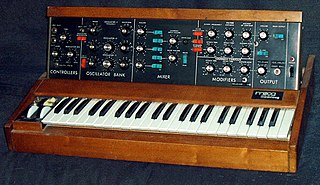
An analog synthesizer is a synthesizer that uses analog circuits and analog signals to generate sound electronically.

The Jupiter-8, or JP-8, is an eight-voice polyphonic analog subtractive synthesizer introduced by Roland Corporation in early 1981.
Doepfer Musikelektronik GmbH is a German manufacturer of audio hardware, mostly synthesizer modules, based in Gräfelfing, Upper Bavaria and founded by Dieter Döpfer. The product range covers analog modular systems, MIDI controllers, MIDI hardware sequencers, MIDI-to-CV/Gate/Sync Interfaces, MIDI master keyboards and special MIDI equipment.
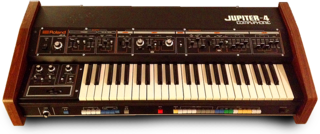
The Roland Jupiter-4 (JP-4) was an analog synthesizer manufactured by the Roland Corporation between 1978 and 1981. It was notable as the company's first self-contained polyphonic synthesizer, and for employing digital control of analog circuits, allowing for such features as programmable memory, voice assignment modes, an arpeggiator, polyphonic portamento and others.

The Korg MS-20 is a patchable semi-modular monophonic analog synthesizer which Korg released in 1978 and which was in production until 1983. It was part of Korg's MS series of instruments, which also included the single oscillator MS-10, the keyboardless MS-50 module, the SQ-10 sequencer, and the VC-10 Vocoder. Additional devices included the MS-01 Foot Controller, MS-02 Interface, MS-03 Signal Processor, and MS-04 Modulation Pedal.
The Korg Poly-61(PS-61) is an analog synthesizer manufactured by Korg between 1982 and 1986. It was the first affordable synthesizer to feature two oscillators per voice, and was Korg's first synthesizer to feature digitally-controlled analog oscillators (DCOs). The Poly-61 marked a significant departure in design philosophy from previous Korg synthesizers by replacing the traditional array of dedicated control knobs on the front panel with a digital interface that required users to select parameters individually for adjustment.

The Roland System-100M was a modular analog synthesizer manufactured by the Roland Corporation in the late 1970s and early 1980s. It was the successor of the Roland System-100, a semi-modular keyboard.

Multivox was an American-based synthesizer company since the mid-1970s until the 1980s. Originally it was founded in the mid-1940s as the guitar and amplifier manufacturing subsidiary of Peter Sorkin Music Company, a New York-based retailer/wholesaler. Then eventually it established separate corporate identity, and after the close of Sorkin Music in the mid-1970s, it continued in existence for fourteen years, according to the Blue Book of Guitar Values. In addition to synthesizers, the company marketed several effects pedals. These included the Big Jam series guitar effects line.
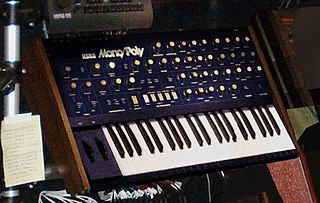
The Korg Mono/Poly (MP-4) is a paraphonic analog synthesizer released by Korg in 1981, bridging the gap between monophonic and polyphonic synthesis. Released in the same year as the Korg Polysix, as a complementary synth, The Mono/Poly is equipped with four VCOs and can operate as a four-voice paraphonic synth with limited capabilities, or as a monophonic synth using all four oscillators. Upon its release, it was the only monophonic synthesizer with an integrated quad-VCO design available on the market.

The Korg PS-3300 is a polyphonic analog synthesizer released by Korg in 1977. It was released alongside the PS-3100, a more compact variant featuring a complete synthesizer voice board for each of its 48 keyboard notes. The PS-3300 essentially combines three PS-3100 units, triggering all voices simultaneously with each key press and mirroring the PS-3100's overall design, featuring a total of 144 synth voices. The PS-3300 uses the PS-3010, a detachable keyboard equipped with an assignable joystick called the X-Y Manipulator.

KORG DS-10 is a music creation program for the Nintendo DS that emulates the Korg MS range of synthesizers. Frequently people refer to the Korg MS-10, however the MS-10 is a single oscillator monosynth. The DS-10 adds sync which the Korg MS-20 is lacking. It was released on July 24, 2008, in Japan, October 10, 2008, in Europe, and November 4, 2008, in the United States.
The Roland MKS-80 Super Jupiter is a rack mount sound module version of the Roland Jupiter-6 and the Roland Jupiter-8 synthesizers. It is an 8-voice polyphonic analog synthesizer that was manufactured by Roland between 1984 and 1987. It is the only one of the MKS series of synthesizers to have analogue voltage-controlled oscillators (VCOs) instead of analogue digitally-controlled oscillators (DCOs). The voice architecture is almost identical to the Jupiter-6 synthesizer. The service manual states that "The module board of MKS-80 features the following in addition to that of JP-6, its brother module. 1) HPF. 2) Low boost circuit in the 2nd VCA. 3) DC supply current boost circuit (IC50)."
Monotron is the collective name of a series of miniature monophonic analogue synthesisers produced by Korg, a Japanese manufacturer of electronic musical instruments. There are three models in the series: the original Monotron, the Monotron Duo and the Monotron Delay. The models share a minimalist set of synthesis components, consisting only of a voltage-controlled oscillator, voltage-controlled filter, a voltage-controlled amplifier and a low-frequency oscillator.

The Korg Minilogue is a polyphonic analog synthesizer released in 2016 by Korg. It offers users four-voice polyphony with two analog VCOs per-voice and was designed to be affordable. It was designed by Korg engineer and synthesizer designer Tatsuya Takahashi, who said "the concept of the Minilogue was to build an analog synthesizer that doesn't rely on the fame and success of an old synth".
The Korg Collection is a suite of virtual instruments and effects that emulate Korg's various hardware synthesizers. The original release included virtual versions of the MS-20, Polysix and Wavestation. Subsequent additions have expanded the collection to feature emulations of the Mono/Poly, M1, ARP Odyssey, Triton, miniKORG 700S, Prophecy and microKORG. These plugins utilize Korg's Component Modeling Technology (CMT) to simulate the analog characteristics of the original instruments. The collection is compatible with VST, AU, and AAX plugin formats and includes standalone versions for use outside a digital audio workstation (DAW).
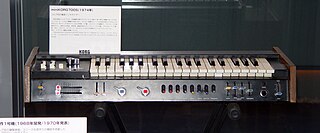
The miniKORG 700 is a monophonic analog synthesizer released by Korg in 1973, marking their entry into mass-produced synthesizers and their first monophonic synthesizer. It was initially designed to be placed on top of an organ, so its controls are located below the keyboard facing towards the performer. An updated model, the miniKORG 700S, was launched in 1974, introducing a second oscillator that could be detuned, along with additional sustain and vibrato controls.
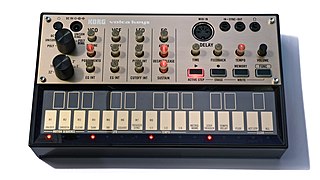
The Volca Keys is an analogue synthesizer manufactured by the Japanese music technology company Korg. It was announced in April 2013 at MusikMesse and was at the time one of the few affordable analogue synthesizers available. The Volca Keys uses subtractive synthesis to create sounds and is three-note paraphonic, meaning that it can play chords with all voices sharing a single voltage-controlled filter (VCF).

The Volca Bass is an analogue bass synthesizer manufactured by the Japanese music technology company Korg. It was released in April 2013 alongside the Volca Keys and Volca Beats.
Tatsuya Takahashi is a Japanese engineer and synthesiser designer. Born in Japan, he studied at the University of Cambridge before joining the Japanese music technology company, Korg. Takahashi has produced several synthesisers with Korg, including the Minilogue and Monotron, as well as the Volca series. After leaving Korg, Takahashi worked with Red Bull Music Academy on several projects before returning to lead Korg's German R&D branch, Korg Berlin.













